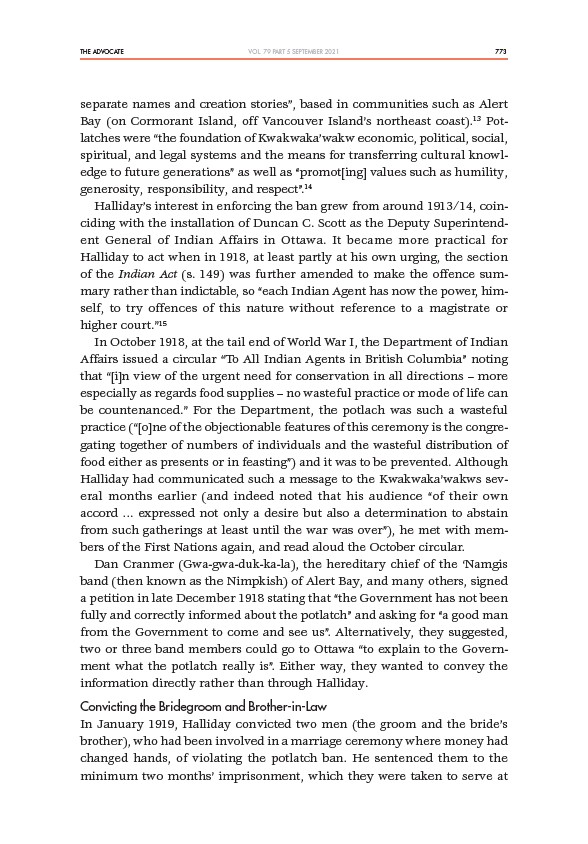
THE ADVOCATE 773
VOL. 79 PART 5 SEPTEMBER 2021
separate names and creation stories”, based in communities such as Alert
Bay (on Cormorant Island, off Vancouver Island’s northeast coast).13 Potlatches
were “the foundation of Kwakwaka’wakw economic, political, social,
spiritual, and legal systems and the means for transferring cultural knowledge
to future generations” as well as “promoting values such as humility,
generosity, responsibility, and respect”.14
Halliday’s interest in enforcing the ban grew from around 1913/14, coinciding
with the installation of Duncan C. Scott as the Deputy Superintendent
General of Indian Affairs in Ottawa. It became more practical for
Halliday to act when in 1918, at least partly at his own urging, the section
of the Indian Act (s. 149) was further amended to make the offence summary
rather than indictable, so “each Indian Agent has now the power, himself,
to try offences of this nature without reference to a magistrate or
higher court.”15
In October 1918, at the tail end of World War I, the Department of Indian
Affairs issued a circular “To All Indian Agents in British Columbia” noting
that “in view of the urgent need for conservation in all directions – more
especially as regards food supplies – no wasteful practice or mode of life can
be countenanced.” For the Department, the potlach was such a wasteful
practice (“one of the objectionable features of this ceremony is the congregating
together of numbers of individuals and the wasteful distribution of
food either as presents or in feasting”) and it was to be prevented. Although
Halliday had communicated such a message to the Kwakwaka’wakws several
months earlier (and indeed noted that his audience “of their own
accord … expressed not only a desire but also a determination to abstain
from such gatherings at least until the war was over”), he met with members
of the First Nations again, and read aloud the October circular.
Dan Cranmer (Gwa-gwa-duk-ka-la), the hereditary chief of the ‘Namgis
band (then known as the Nimpkish) of Alert Bay, and many others, signed
a petition in late December 1918 stating that “the Government has not been
fully and correctly informed about the potlatch” and asking for “a good man
from the Government to come and see us”. Alternatively, they suggested,
two or three band members could go to Ottawa “to explain to the Government
what the potlatch really is”. Either way, they wanted to convey the
information directly rather than through Halliday.
Convicting the Bridegroom and Brother-in-Law
In January 1919, Halliday convicted two men (the groom and the bride’s
brother), who had been involved in a marriage ceremony where money had
changed hands, of violating the potlatch ban. He sentenced them to the
minimum two months’ imprisonment, which they were taken to serve at